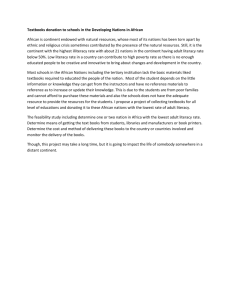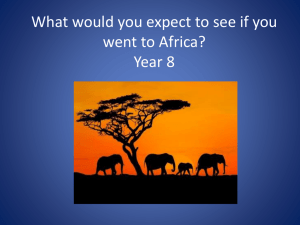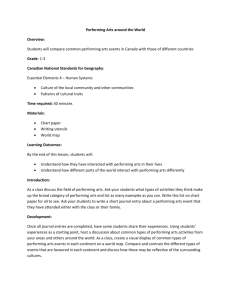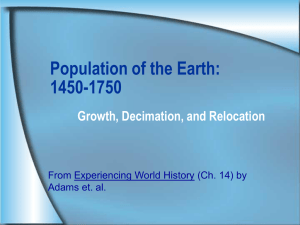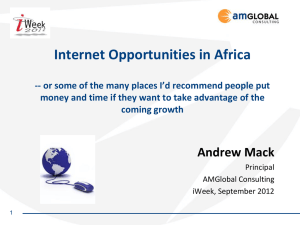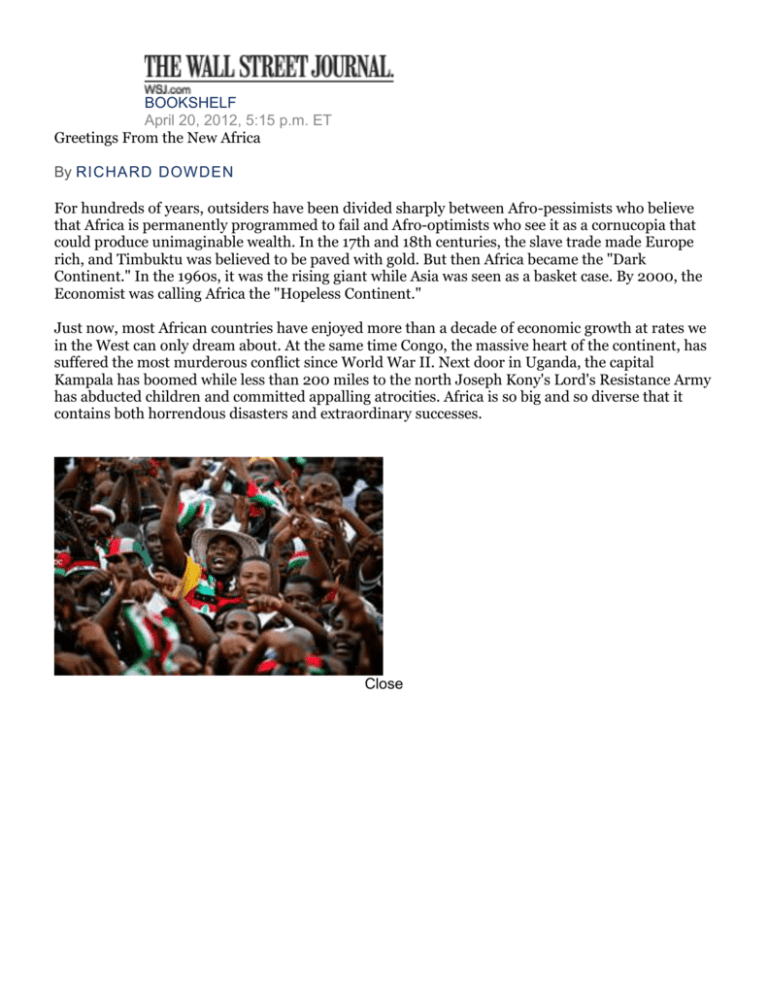
BOOKSHELF
April 20, 2012, 5:15 p.m. ET
Greetings From the New Africa
By RICHARD DOW DEN
For hundreds of years, outsiders have been divided sharply between Afro-pessimists who believe
that Africa is permanently programmed to fail and Afro-optimists who see it as a cornucopia that
could produce unimaginable wealth. In the 17th and 18th centuries, the slave trade made Europe
rich, and Timbuktu was believed to be paved with gold. But then Africa became the "Dark
Continent." In the 1960s, it was the rising giant while Asia was seen as a basket case. By 2000, the
Economist was calling Africa the "Hopeless Continent."
Just now, most African countries have enjoyed more than a decade of economic growth at rates we
in the West can only dream about. At the same time Congo, the massive heart of the continent, has
suffered the most murderous conflict since World War II. Next door in Uganda, the capital
Kampala has boomed while less than 200 miles to the north Joseph Kony's Lord's Resistance Army
has abducted children and committed appalling atrocities. Africa is so big and so diverse that it
contains both horrendous disasters and extraordinary successes.
Close
Reuters
Ghanaians rally for the opposition National Democratic Congress in 2008. Their candidate, John
AttaMills, won a close-fought election that year after having lost two previous presidential elections
(in 2000 and 2004).
Stephen Ellis, a professor of social sciences in Amsterdam, and Jean-Michel Severino, a former vice
president of the World Bank and for 10 years the head of France's international aid agency, have
been at the forefront of analysis and debate about Africa for almost three decades. Mr. Ellis in
"Season of Rains" and Mr. Severino in "Africa's Moment" both offer up their optimistic views of the
continent and its prospects. Both believe that Africa is transforming rapidly and will play a global
economic and political role in the 21st century. Both begin their books by discussing Africa's
booming population and the likely effects of its expected doubling to around two billion people by
the middle of the century. And both agree that our images of Africa and attitudes toward it are out
of date.
Africa's Moment
By Jean-Michel Severino & Olivier Ray
Polity, 317 pages, $25
At first, in the 1960s, the independent African nations, supported by aid, did well. They funded
development plans with massive borrowing backed by mineral deposits and raw materials. Aid was
politically influential, too, during the Cold War, when it mattered whose side you were on. But after
1989, Africa was abandoned. Europe and the United States walked away, leaving a simple
prescription for the future: democracy, human rights and the free market. (As one American
official quipped to me in 1993: "If you get the third one right, you might get a discount on the other
two.")
The continent was essentially handed over to the World Bank and the IMF. They imposed
"structural adjustment programmes." African governments were forced to slash health, education
and infrastructure budgets (laying off a generation of employees) and float their currencies in the
belief that less government and more open markets would attract investment. But African
currencies sank like rocks in the 1990s, and millions of people were impoverished. Aid halved as
the European Union and the United States instead poured support into Eastern Europe.
Season of Rains
By Stephen Ellis
Chicago, 215 pages, $25
As the African state patronage machines dried up or broke down, more than a dozen rebellions and
wars broke out or intensified—in places as diverse as Togo and Somalia. Once-favored dictators
like Congo's Mobutu Sese Seko were overthrown, and instability followed insurrection. Investors
stayed away, fearful of war, disease, hunger and poverty. Worse, the HIV/AIDS pandemic erupted,
the biggest and deadliest human catastrophe since the Black Death. According to the United
Nations, 17 million Africans had died of AIDS by 2004, and an additional 24.5 million were
infected with HIV.
In the last years of the 20th century, two new factors came into play. Neither had much to do with
the West's preferred prescription for a sick continent. First, the Chinese government decided that
Africa would be a key source of the raw materials that it desperately needed for its booming
manufacturing industries. The Chinese went where white men feared to tread, and their voracious
demands for African minerals pushed prices up and began to revive African economies. Second,
small mobile-phone companies set up masts in African capitals, believing that maybe the top 2% or
3% of Africans might want a mobile phone. They were wrong. In a continent of talkers with fewer
than 27 million landlines, everybody wanted one.
Close
Corbis
Africa was a lot richer than the World Bank's figures indicated. The bank missed the "gray
economy" on which much of the continent survives and, in some places, thrives. Cellphones and
the scratch cards that supply minutes to any phone sold like crazy, not least in the lower tiers of the
economy, in the new millennium. By 2008 more than 40% of Nigerians were mobile-phone
subscribers. But according to U.N. human-development indexes, over 60% of these people were
poor—living on less than $2 a day. Drivers of battered old taxis and pavement-stall sellers were
suddenly talking and texting, buying and selling. Meanwhile entrepreneurial middle-class Africans,
many of whom had studied outside their own countries, took advantage of the economic growth
and newly available communications to set up service businesses. It was a good decade in Africa.
For Mr. Severino, in "Africa's Moment," what matters now is the demographics: the coming African
population explosion and the mass movement of people from rural areas to towns. The population
boom is partly due to a decline in infant mortality. According to the World Bank, in 1970 there
were 136 deaths per thousand live births; by 2009, the number had dropped to 72.6. But the
birthrate itself remains very high in many African nations. The U.S. fertility rate is estimated at 2.1,
Europe's is 1.59. Sub-Saharan Africa's is estimated at 4.94. One simple fact is clear: Many Africans
want to have many children.
Africa, Mr. Severino notes, had a fifth of the world's population in 1500 and then suffered four
centuries of mortal disruption. It is only now catching up. But this raises a question. Historically,
when populations have exploded—such as Europe's in the 19th century—the answer was
emigration. But tomorrow's young Africans will have nowhere to go. The African population boom,
Mr. Severino believes, will be "the most incredible demographic adventure that human history has
ever known. A time neither for rejoicing nor for fear, but simply for recognizing the facts. . . .
Africa's demographic advance over the next fifty years is unstoppable. The worst thing to do would
be to ignore it."
"Africa's Moment" is a wake-up call. The book—which Mr. Severino wrote with Olivier Ray, one of
his former colleagues at the French aid ministry—is a broad survey of contemporary Africa. Its
message is simple: Look out world, here comes Africa. Early on, Mr. Severino dismisses Afropessimist theories that claim that the continent is immutable because of its culture or climate. He
predicts that the Africa of the future will be urban. The cities will enable social freedom that will
melt ethnic and cultural differences and allow people to form communities of choice.
Mr. Severino thinks that churches rather than the ethnic groups will be the particular glue that will
bind people together in the future and offer them solidarity in hard times. The growth of
evangelical Christianity all over Africa is an extraordinary recent phenomenon—whole
communities forming around a single pastor. Funded by American fundamentalist churches, these
pastors and preachers are quickly drawing members away from the traditional established
churches. Their equally dynamic counterparts are fundamentalist mosques supported by
benefactors in Saudi Arabia.
What Africa lacks right now are the manufacturing businesses that might employ the new millions.
At present, cities are largely unplanned slums, and Africa's rulers have allowed their countries to
become rentier states. The continent's rich resources are extracted and shipped out with revenues
and kickbacks going to politicians, not their populations. Mr. Severino estimates that between 30%
and 50% of the national incomes of Africa's oil producers disappear, being either stolen and
exported to secret tax havens.
Yet we can easily find real success stories. Ghana and Mozambique have both turned their
economies around by taking advantage of the resource boom and creating regulatory frameworks
that attract local and outside investment. Ghana has achieved a consistent 5% growth rate since the
turn of the century, when political stability encouraged the rising middle classes to create a
domestic market for goods and services. Consistent government policies, not to mention politicians
who accept election results, have encouraged long-term investment in property and local
manufacturing. Mozambique has a similar recent history and is heading for a growth rate of over
7% this year.
There is no magic recipe for turning countries around, Mr. Severino writes, only good cooks. He
believes that 20 years after democracy was prescribed to Africa by the West, there are the
beginnings of local democratic activities all over the continent that are forcing governments to
deliver. One hopes this is true, though he offers no concrete examples. Uganda, another
economically successful country, suggests the opposite. Yoweri Museveni, in his successful bid to
remain president after 25 years in the job, went around the country last year handing out cash to
village chiefs and others who might swing the vote his way. It worked. He was re-elected.
What Mr. Severino worries about more than local government is Europe. The continent closest to
Africa has turned its back on its neighbor and is ignoring the rising threat of unmanageable
migration from Africa to Europe (an obvious outcome of the population explosion). It is not just
that China is driving—and taking full advantage of—Africa's transformation. So is India, whose
corporate giants and ambitious small fry sense opportunity. Companies like China's Sinopec and
India's Tata are buying up or setting up manufacturing and services industries in Africa. European
nations are paying no attention to the boom.
Stephen Ellis would certainly agree. "Africa's exclusive relationship with West European countries
imposed in colonial times is gone forever," he says in "Season of Rains." Africa is becoming master
of its own destiny, and the continent is heading "neither to perdition nor redemption." Like Mr.
Severino, Mr. Ellis sees China as the main driver of Africa's current transformation. His short
book—just six chapters—is calmly analytical rather than alarming or predictive.
He has an eye for inverting widely held beliefs. He attacks, for example, the militant panAfricanists who blame the continent's predicament on colonialism and neocolonialism. On the
contrary, he says, it is the African rulers who were always in control, deftly manipulating former
colonial masters into giving aid or else. He recalls Claude Ake, a Nigerian academic, who showed in
the 1990s that it was often in the interests of African rulers to keep their countries from developing.
The aid relationship offered them funding "beyond the limits of any tax contract with their own
citizens," and they used the threat of chaos to warn donors that the aid must keep flowing.
Yet sometimes Mr. Ellis goes too far. He says that Africa gets the leaders it deserves, and he
believes it pointless to analyze Africa through the Really Great Man/Really Awful Man dichotomy.
But that can't be right. Nelson Mandela and Robert Mugabe ruled neighboring countries. One
chose to step down after one term and helped his country to take an astounding leap forward. The
other wrecked his country and wants to rule till he dies. Individuals are important.
But Mr. Ellis does show how African states are influenced by familial or ethnic networks of
obligation and control that flourish beneath the veneer of apparently modern states. There is an
official system of government, and there is a shadow world. Between them is a "reality gap" in
which crucial decisions of state are taken, dictated by hidden but powerful relationships. Angola's
impenetrable allocation of oil concessions is the most egregious example. The president's daughter
and son-in-law sit on the boards of companies that have been awarded lucrative oil concessions. In
many African countries, a local partner is needed to steer a foreign investor past the sharks and
shoals. This is where family connections to power thrive.
He also shines a light on the widespread belief in spirits with effective powers over the material
world—spirits that can be appeased or manipulated by certain individuals. In his book on Liberia,
"The Mask of Anarchy" (1999, but revised in 2006), Mr. Ellis recounted how Charles Taylor, former
president of Liberia now awaiting the verdict of the International Criminal Court in The Hague,
became a Zo, an elder of one of the secret mystical societies who claim to control powerful spirits.
This, Mr. Ellis says, may be Africa's equivalent of the West's belief in the hidden hand of the
market, and just as powerful. An alarming thought.
Traditional African cultures and belief systems have survived into modern times. Africans will thus
do things differently from other parts of the world, and many ventures by outsiders have come
unstuck because they did not take this fact into account. The attitude to land outside towns is a
good example. A large British-based corporation recently developed a new sugar estate in southern
Africa. The day after it opened, a line of about 90 people formed outside the headquarters claiming
that the new estate was on their land. The head of the company admitted to me that he then made a
big mistake. There being no written records, he agreed to pay them off. The next day twice as many
were claiming the land as theirs.
Will Africa's growing economies and increasing freedom from Western influence mean a reversion
to African values? Mr. Ellis would say yes. Western companies will have to abide by African rules
that may not be compliant with the codes of conduct of their home country. Or perhaps a
convention will develop whereby, as part of an investment, a company makes a substantial
contribution to development in the area it is investing in. Mr. Severino would disagree, seeing
economic development as likely to take its usual toll and overwhelm local traditions.
My own sense is that Africa's ways of doing things are as resilient as Mr. Ellis suggests. But Mr.
Severino is right about the popular demand for change. I see more and more young and connected
Africans, many inspired by the Arab uprisings of last year, realizing that the future will not be given
to them. They will have to create it for themselves. It may be a rough ride, but increasingly it will
not matter whether the rulers are Mandelas or Mugabes because, good or bad, they will be forced
by the people to deliver livelihoods for the people. Good and bad, Africa cannot be ignored in the
21st century as it was at the end of the 20th.
—Mr. Dowden, director of the Royal African Society, is the author of "Africa: Altered States,
Ordinary Miracles."
A version of this article appeared April 21, 2012, on page C5 in some U.S. editions of The Wall
Street Journal, with the headline: Greetings From The New Africa.
Copyright 2012 Dow Jones & Company, Inc. All Rights Reserved
This copy is for your personal, non-commercial use only. Distribution and use of this material are
governed by our Subscriber Agreement and by copyright law. For non-personal use or to order
multiple copies, please contact Dow Jones Reprints at 1-800-843-0008 or visit
www.djreprints.com

